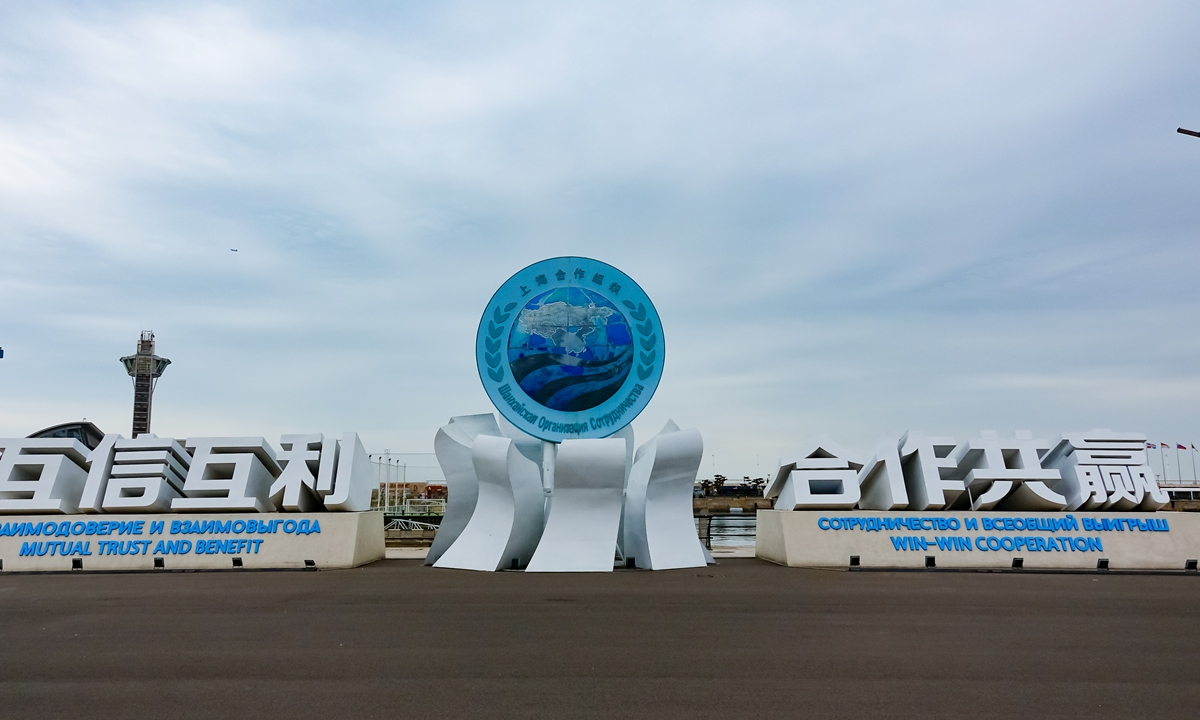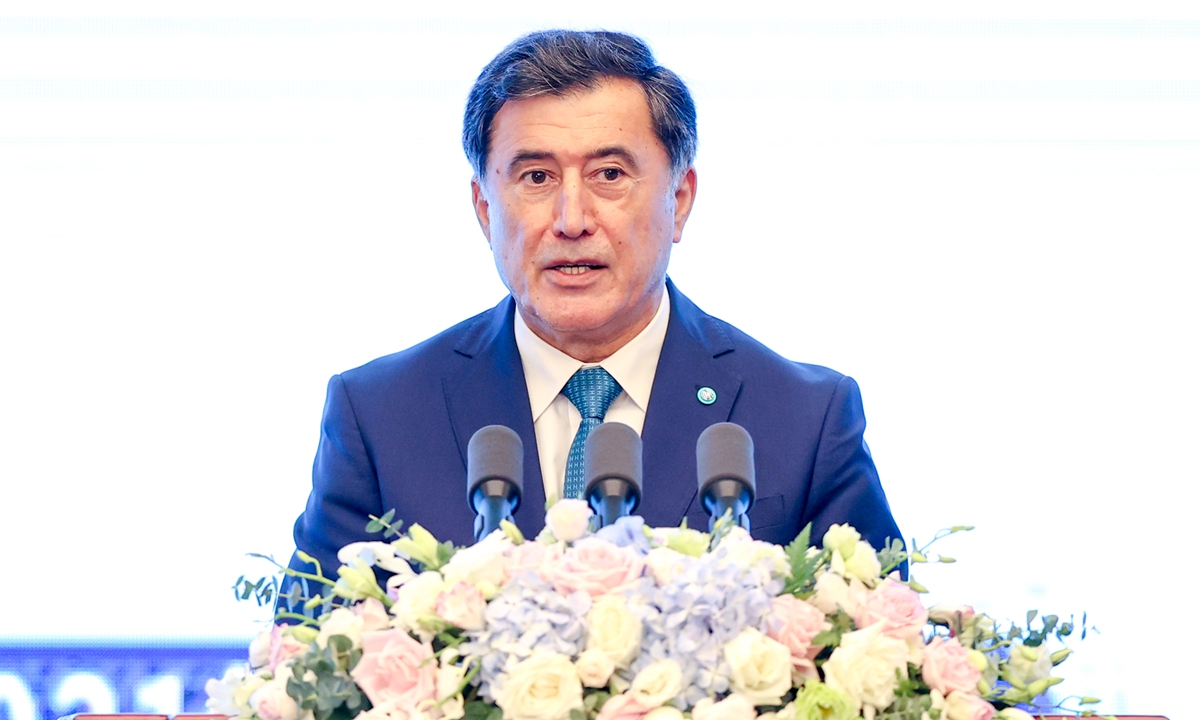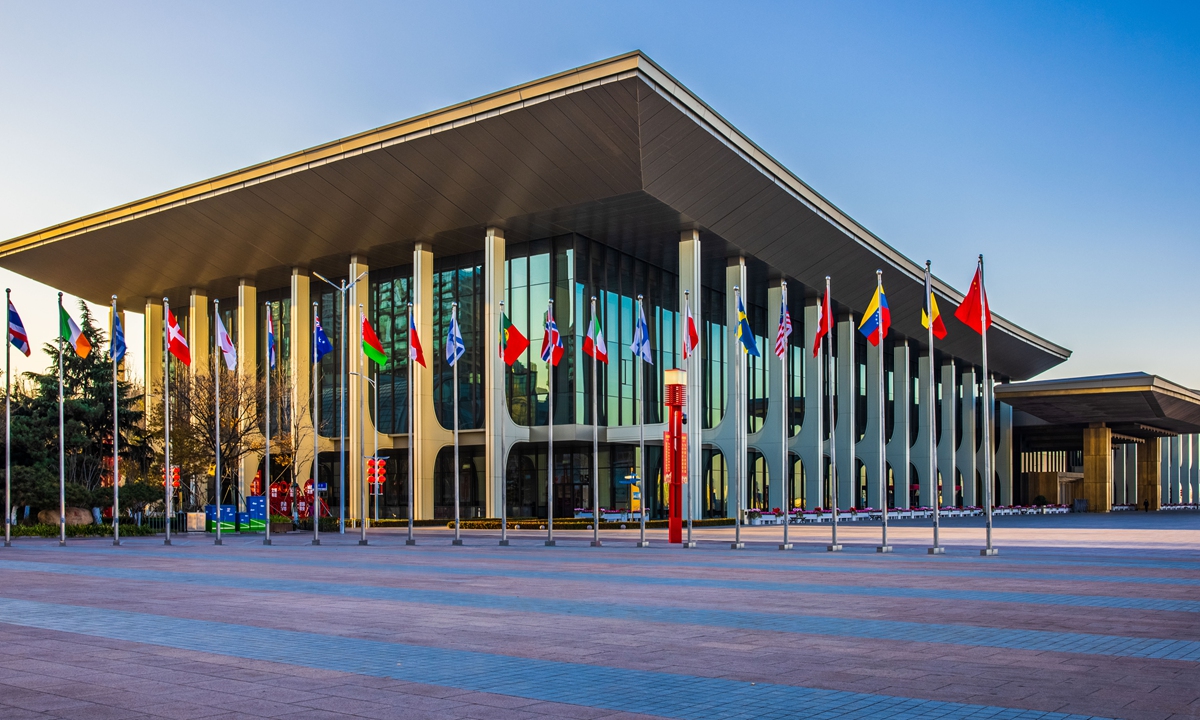
The commemorative monument of SCO Qingdao Summit on December 8, 2020 Photo: VCG
Editor's Note:Twenty years ago, the Shanghai Cooperation Organization (SCO) was established by the side of the Huangpu River of Shanghai in June 2001. Over the past two decades, SCO has played an important role in Eurasian and international affairs. Up to now, SCO has had eight member states, four observer states, and six dialogue partners.
In the past 20 years, the "Shanghai Spirit" of mutual trust, mutual benefit, equality, consultation, respect for cultural diversity, and pursuit of common development have been the basis of the SCO, which also represents the development direction of today's international relations.
Recently, Secretary-General of the Shanghai Cooperation Organization Vladimir Imamovich Norov (Norov) received an exclusive interview with the Global Times (GT). He said that the "charm" of the "Shanghai Spirit" lies in ensuring peace through dialogue and establishing cooperation to promote development. He advocated openness and called for abandoning the Cold War mentality to adapt to the requirements of the times.
GT: The SCO is gaining greater regional appeal and international standing. What do you think is the charm of the Shanghai Spirit?Norov: In the 20 years since its establishment, the SCO has always adhered to the Shanghai spirit of "mutual trust, mutual benefit, equality, consultation, respect for diverse civilizations, and the pursuit of common development," and has been committed to solving the practical problems of inter-state relations along the path of common development.
The Shanghai Spirit promotes the democratization of international relations and defines the ideological and political essence of the SCO that all countries, regardless of their size, economic potential, and cultural-civilizational differences, are equal partners. Its essence is to guarantee peace through dialogue, establishing cooperation for development, being non-aligned and non-targeted to third parties, opening up to the outside world, and abandoning the Cold War mentality.
Over the past 20 years, the activities of the SCO have been aimed at strengthening mutual trust and good-neighborly relations among the countries of the region, promoting the establishment of a new democratic, just, and rational international political and economic order. As a new type of regional international organization, the SCO will continue to follow the principles of the Shanghai Spirit and adhere to the policy of building a balanced, fair and effective system of international relations.

Secretary-General of the Shanghai Cooperation Organization Vladimir Imamovich Norov Photo: cnsphoto
Fighting terrorismGT: In the past 20 years since it was established, what contribution has SCO made in maintaining regional peace, security and stability, and promoting regional economic cooperation and development?
Norov: Since its establishment, the main purpose of the SCO has been to maintain and strengthen regional peace and stability. Three months before the September 11 incident in 2001, the SCO signed the Shanghai Convention on Combating Terrorism, Separatism and Extremism, and for the first time clearly defined terrorism, separatism and extremism.
The adoption of the document shows that the founding countries of the SCO had a clear recognition of the new challenges and threats facing international security at the time, and have since embarked on the path of uncompromising struggle against them.
Up to now, the SCO has formed a set of documents regulating anti-terrorism and anti-extremism. A major step taken recently in this area is the signing of the SCO Convention on Combating Extremism by the heads of member states in 2017. This convention is universal and open, and any country concerned can join.
Another important cooperation direction of the SCO is to combat drug trafficking. Of the opioids intercepted in the entire Eurasian continent each year, 40 percent are seized by our cooperative anti-drug agencies from traffickers.
Since 2019, in the International Anti-Drug Operation Spider Web, practical measures have been formulated to jointly address international and regional drug problems, aiming to stop the supply of plant and synthetic drugs, including cracking down on the spread of the drugs via the dark web.
The SCO pays special attention to the new challenges and threats created by the complex military-political and criminal situation in Afghanistan. Our starting point is that the conflict in Afghanistan can only be solved through political dialogue, and an inclusive peace process should follow the principle of "Afghan-led" and "Afghan-owned."
We are ready to continue the joint work of the "SCO-Afghanistan" liaison group. The next high-level meeting of the liaison group will be held in Dushanbe in July this year. The purpose is to discuss specific measures to implement the joint "roadmap" for further action.
In addition, the SCO is one of the first regional organizations to put the issue of information security on the agenda.

The site of SCO Qingdao Summit on December 8, 2020 Photo: VCG
Building multipolar world orderGT: Some Western countries now pursue unilateralism and adopt the Cold War mentality, which has led to divisions and conflicts in the international community. Against such a background, what role has the SCO played in maintaining world stability and promoting international cooperation?
Norov: The establishment of the SCO is the result of profound changes in the international political structure caused by the collapse of the bipolar structure and the emergence of newly independent states in the Eurasian region. This also creates the need for a high-quality international communication system not based on ideological confrontation and the primacy of violence, but on the principles of equality, mutual respect, and mutual trust between nations.
Since its establishment, the activities of the SCO have been based on the principles of mutual respect for sovereignty, independence, territorial integrity, inviolability of state boundaries, non-aggression, non-interference in internal affairs, and non-use of force or threat in international relations. Twenty years later, it is sure to say that within such a short period, the SCO has successfully integrated with the modern system of international relations and won its rightful place.
Within the framework of the SCO, a broad legal and regulatory framework has been established, based on the Charter of the Shanghai Cooperation Organization and the Treaty among the Member States of the Shanghai Cooperation Organization on long-term good-neighborliness, friendship and cooperation. Speaking overall, cooperation among member states in various fields is regulated by about 70 agreements and other normative documents.
Currently, international relations are in a stage of profound transformation with the consolidation of new political and economic centers, and the formation of a multipolar world order. The SCO supports the establishment of a multipolar world order and the consolidation of global and regional security and stability on the basis of the universally recognized norms of international law, multilateralism, equality, indivisible security, and opposition to conflict and confrontation.
The SCO member states believe it is of great importance to take initiatives to promote a new type of international relations featuring mutual respect, fairness, justice and win-win, and to forge a common vision of building a community of a shared future for mankind.
GT: What are the opportunities and challenges for the SCO?
Norov: With the accession of India and Pakistan in 2017, the scope of SCO activities has been significantly expanded, and cooperation in ensuring regional security, while expanding and deepening economic and cultural cooperation, has also increased.
The rising geopolitical tensions, common threats, and challenges today call for our collective efforts to build a more just and polycentric world order and to develop comprehensive programs to combat these threats.
The growing negative trends in the international community and the increasing common threats and challenges facing the SCO countries make it necessary for us to coordinate our efforts in order to safeguard our positions and interests. The most important task now is to reject populism and protectionist ideas.
In practice, the SCO followed the guidelines of the SCO Development Strategy until 2025 and is prepared to continue its efforts to expand and deepen cooperation within the SCO as well as with the international community, with a view to ensure security and prosperity in the Eurasian region.
New threats and challenges to global and regional security posed by the pandemic, information, and communication technologies, bioterrorism, drug trafficking, and cross-border organized crime call for an integrated approach to deal with them on an inclusive and multilateral basis.
Navigating through pandemicGT: What do you think of the efforts of China and the SCO in fighting the COVID-19 pandemic?
Norov: China has accumulated rich experience in the fight against the COVID-19 pandemic and has established an effective system of preventive and control measures based on science, and combined with modern scientific and technological means. At the beginning of the pandemic, China provided necessary assistance to the SCO countries, including the provision of medicines, medical equipment, and the dispatch of medical experts. The COVID-19 vaccines developed by China have been supplied to more than 100 countries and regions, including the SCO countries. Chinese vaccines have become the hope for developing countries to end the pandemic, which has proven China's important role in the global fight against the pandemic. China has been taking action to fulfill its earlier commitment to making the vaccine available and affordable to developing countries.
The SCO, as a multilateral organization, has also played an important role in the fight against the pandemic. After the outbreak, the SCO adopted a series of necessary normative laws and regulations, established a special cooperation mechanism, held regular sectoral meetings to discuss and formulate specific measures to deal with the pandemic, and put them on the agenda of the highest body of the SCO. The SCO member states have fully activated existing mechanisms and taken decisive action to prevent the spread of the disease.
As a platform for multilateral dialogue, the SCO has a unique and irreplaceable potential to develop and implement collective measures, and as is in line with the Shanghai Spirit, the SCO member states have demonstrated a high degree of solidarity, mutual support and cohesion in strengthening cooperation in the relevant areas.
GT: Rural development and poverty reduction were also important topics at the SCO Forum on People-to-People Friendship held in Wuhan earlier this month. What, in your opinion, in China's experience in this area can be borrowed by the SCO member states and other countries of the world?
Norov: China has achieved great success in fighting poverty and has made a significant contribution to global poverty eradication efforts. Based on the efforts of all levels of department, China has built a proven and effective model for poverty eradication. This valuable experience is useful in poverty reduction and alleviation efforts around the world.
UN Secretary-General Antonio Guterres said that "China is the country that has contributed the most to global poverty reduction in the past 10 years."
It should be noted that China achieved the poverty reduction goal set out in the UN 2030 Agenda for Sustainable Development 10 years ahead of schedule, laying the foundation for the implementation of this program in other countries and regions of the world.
China offers many lessons, such as identifying poverty regions through precise identification - the creation of a poverty file for each poor household, which is an important hurdle that must be overcome in the process of poverty eradication.






